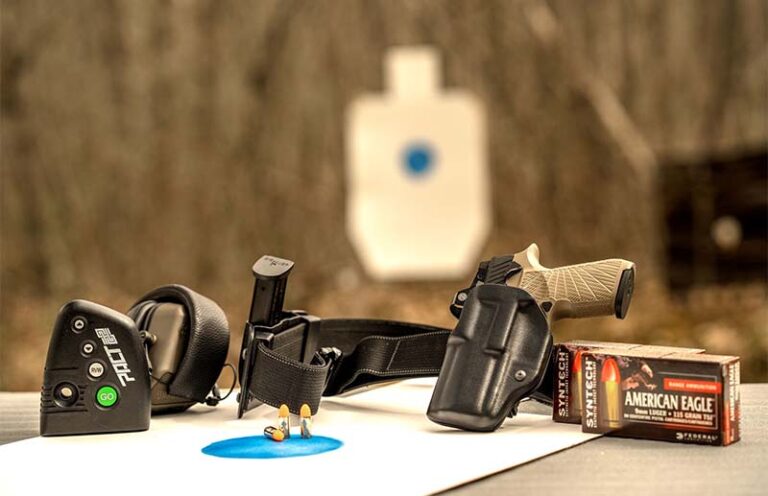
How to improve your defensive semi-automatic handgun skills by balancing speed, power and accuracy.
Students of the defensive handgun should be familiar with two triangular concepts codified by Gunsite Academy founder Jeff Cooper. They’re important because they’re a prerequisite to the application of a semi-automatic handgun in an effective and efficient manner during a self-defense situation. Often, the unknowing believe that because they’re a good shot or have had some training, they’re good to go. The truth is that true proficiency comes from being able to understand and execute each element of this double triad guideline.
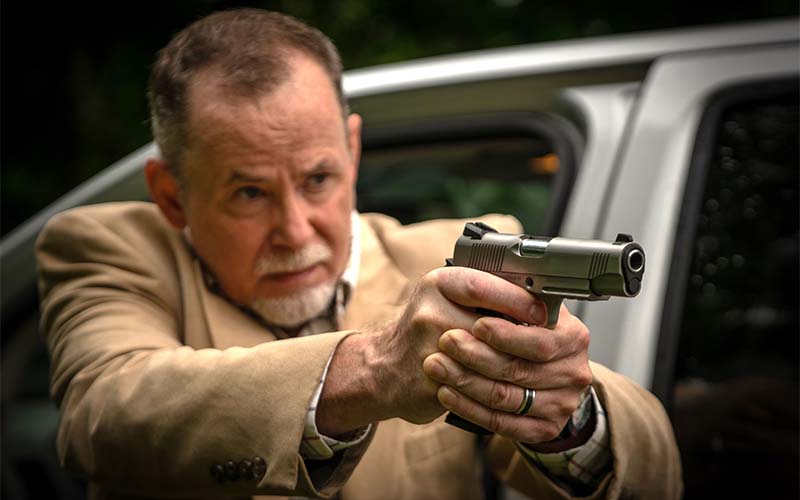
The first triad is the Gunsite and IPSC (International Practical Shooting Confederation) motto, “Diligentia, Vis, Celeritas”—Latin for accuracy, power and speed. It’s often represented as simply, “DVC.” The other is the Combat Triad that represents the desired balance of mindset, marksmanship and gun handling. Together, they represent the totality of the proper application of the defensive semi-automatic handgun. And, combined, they’re also best described as “weaponcraft.”
The DVC Triad
The unique thing about the DVC Triad is that it doesn’t represent an equilateral triangle. In other words, the three elements that make up DVC aren’t always of the same importance. Depending on the situation, one or two of the elements might be more important than the others. Essentially, the situation dictates the shape of the triangle. However, before we get into exactly how this triangle is managed, we need to understand each of its sides.
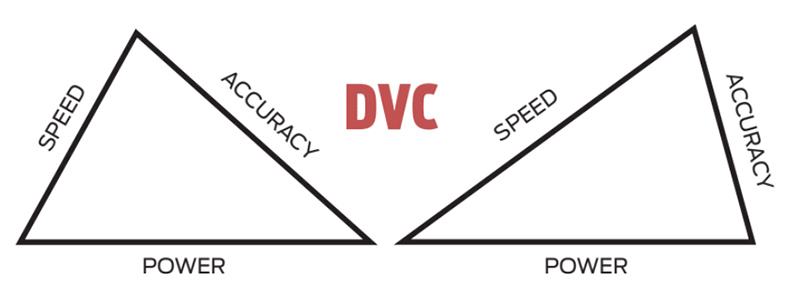
Accuracy
Semi-automatic handguns deliver a certain level of precision. It’ll vary from gun to gun and is also dependent on the ammunition used. Precision represents the ability of the gun to place bullets very close to the same point every time. Most defensive handguns can keep all the bullets they fire inside a 2-inch circle at 10 yards.
On the other hand, accuracy is a representation of how well a shooter can cause a handgun’s precision to deliver a bullet to a desired point of aim. Accuracy is limited by the gun and ammunition, but mostly by the marksmanship ability of the shooter. A practical accuracy standard for a shooter would be keeping all their shots in a 2-inch circle at 5 yards.
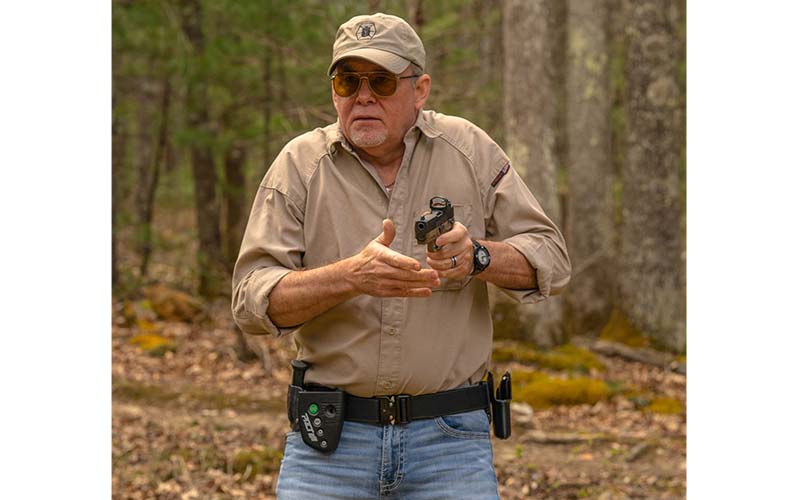
Power
There are several ways to define handgun power. Competitive combat shooting uses what’s known as “power factor,” which is calculated by multiplying the weight of the bullet in grains, by its muzzle velocity in feet-per-second, and then dividing the product by 1,000. For example, a 124-grain bullet at 1,100 fps would have a power factor of 136.4. Another way of measuring power is by muzzle energy, which is often listed on the box of ammunition. However, neither calculation considers the terminal performance of the bullet.
What we can postulate is that a handgun/load combination that has a higher power factor or muzzle energy, will—given similar bullet performance—be more effective. Simplified, power works into this equation because we understand that a .45 Auto is more lethal than a BB gun. However, we must balance the power we deliver on target with the recoil we’re able to withstand.
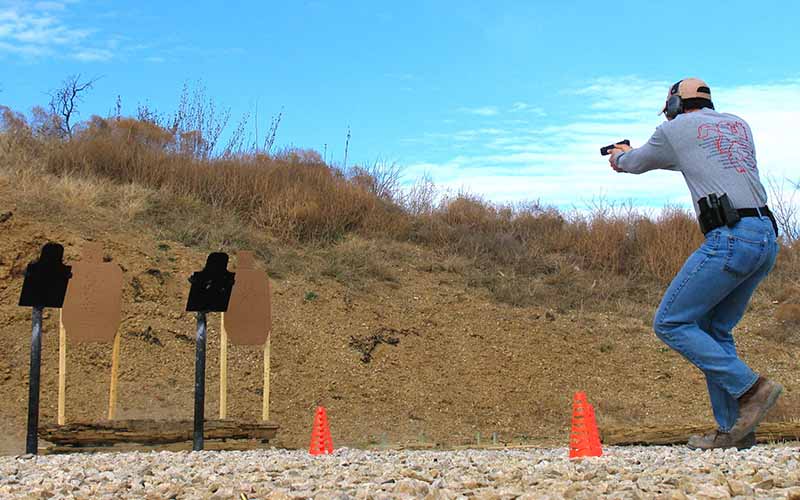
Speed
Though the Old West shootout, where the fastest draw often won, is mostly a myth, speed does matter. The faster you can get your handgun out of a holster and deliver an accurate and powerful shot, the more likely you are to survive a lethal encounter. Sometimes, though, you need to deliver multiple shots … and that’s where speed and power are at odds.
A 10mm is a powerful handgun cartridge, but you cannot deliver multiple accurate shots with it nearly as fast as you can with a 9mm. Wyatt Earp is often credited with saying, speed is fine, but accuracy is final. There’s some truth to that, but if you’re not fast enough, you can be too late. When it comes to drawing your handgun from concealment and getting a hit, at about 5 yards you should be able to do this within 2.5 seconds.
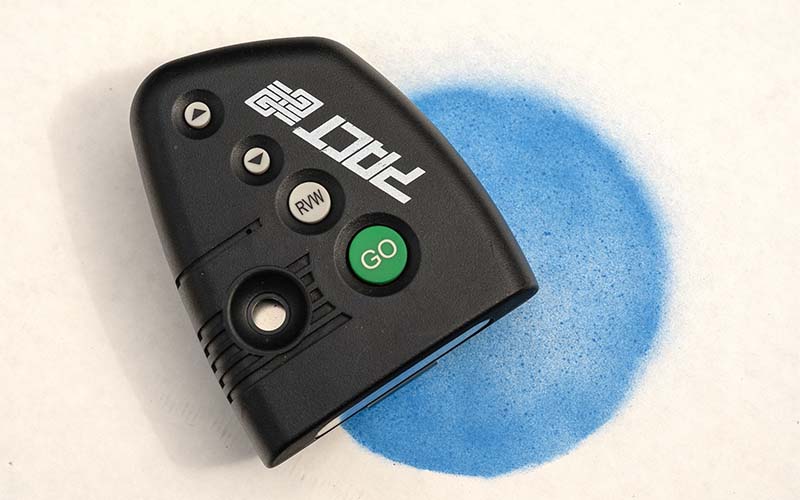
Adjusting The Triangle
The first step in building the DVC triangle is to determine the level of power you can effectively manage. You need discover with what cartridge and handgun style and size you reach your limit. Unless you always carry four or five handguns and wait for the situation to determine which one you use, power becomes the base of the triangle because it’s a fixed element. It’s a product of the gun and load you select.
However, the necessary accuracy and speed vary, depending on the situation. For example, if you’re accosted and the distance is close, you need to get your gun out lightning fast and deliver an accurate shot quickly, but it just needs to be kill-zone accurate. On the other hand, if you’re hiding behind your car and attempting a head shot on a gunman who is wearing body armor at 25 yards, accuracy then becomes the larger—more important—side of the triangle.
The Combat Triad
The basis for the Combat Triad is also a triangle, but it’s more of an equilateral triangle, meaning that each of the sides of this triangle are of equal importance … and their relationship to each other never changes. Without understanding the Combat Triad, you cannot develop or adjust your DVC triangle.
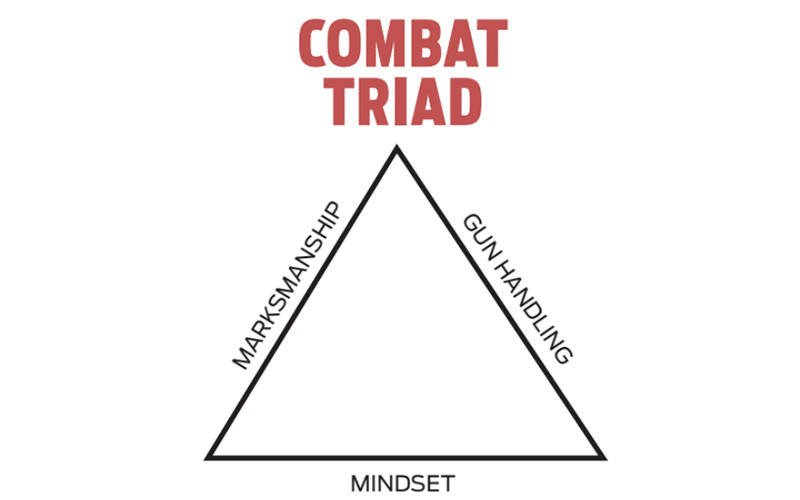
Mindset
There are two elements of mindset. The first is that of survival. When encountered with a lethal situation, you must commit to the fight as though it’s the only thing in the world that matters. You must be mad-dog mean and deliver as much force in the most lethal manner possible to your assailant.
But part of mindset is also tactics. You must know how to utilize cover and concealment, when to shoot and when to move … and even when to run. Just as important is having a plan to deal with specific self-defense situations. When something happens you need to think, I thought this might happen and I know what to do, as opposed to, holy hell, what do I do now?
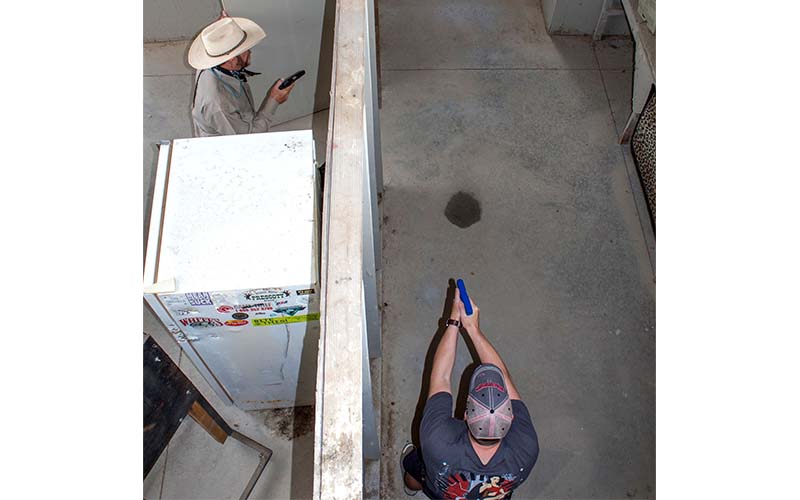
Marksmanship
Marksmanship isn’t just accuracy, it’s the knowledge of knowing when to shoot, where to shoot and how to shoot to best solve the problem you’re faced with. Learning to shoot a semi-automatic handgun accurately is one thing. Learning how to do it from a wide range of positions, in varied lighting conditions, and at varied targets—points of aim—is another thing entirely. Just because you can stand in front of a target and make bullet holes where you want them isn’t enough. You need to be able to do that no matter the situation, whether you have both feet on the ground or just your ass.
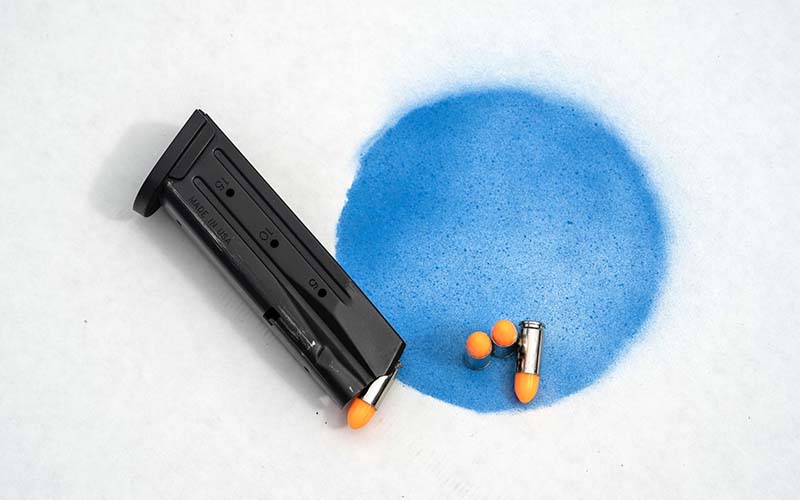
Gun Handling
This is possibly the most overlooked aspect of not only the Combat Triad, but of weaponcraft in general. It’s also an element of firearms training that’s largely overlooked by many instructors and training programs. You must be as proficient at handling your semi-automatic handgun as you are with your toothbrush. You must be able to do everything you need to do with it safely, swiftly and efficiently. This encompasses everything from taking it out of your range bag, to loading it, to unloading it and keeping it running if you have a stoppage. It also encompasses maintenance. If you cannot handle/maintain your gun, you cannot win the fight.
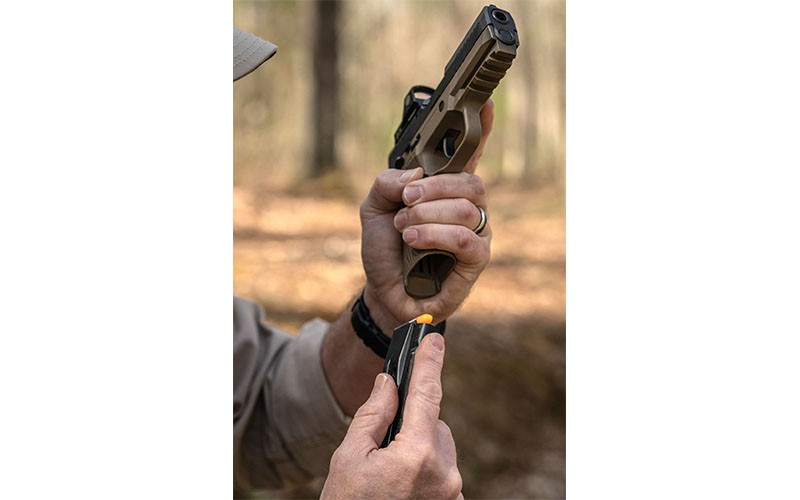
Building The Triangles
As with any skill, the first requirement is to establish what needs to be learned, and it’s no different when it comes to weaponcraft with the semi-automatic self-defense handgun. The very first thing you must establish is the survival mindset—the will and determination to fight to the last breath. When my grandfather used to want us boys to do something with the utmost enthusiasm, he used to tell us, “Go at it like you’re killing snakes,” and that’s the mindset you must have. Not only must you begin with it, but you must also continue to foster and develop it.
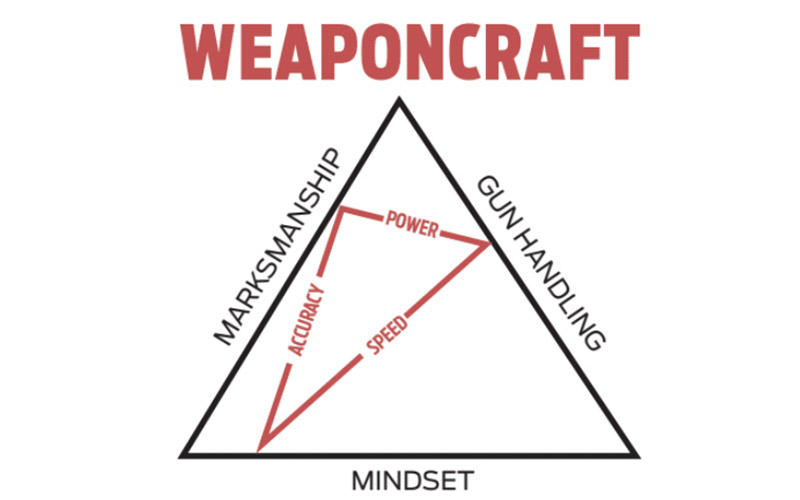
The next thing you must do is establish the power you’re capable of controlling. Attempting to manage too much handgun too soon will negatively impact your ability to develop both your DVC and Combat Triad triangles. However, as you become more proficient with the various sides of these triangles, you might find out that you can harness the recoil of a more potent cartridge, or possibly a smaller handgun chambered for your current cartridge that recoils more.
Next on the agenda is gun handling. Most shooting schools understand that their students come there to shoot and won’t be happy unless they do a lot of shooting. Therefore, the lessons of gun handling that should be mastered before any shooting begins are often overlooked, or instructors attempt to integrate them with the shooting instruction. You should learn to handle your gun in every way it can be handled well before you even begin to shoot it. Failure to do so will detract from your ability to learn anything else.
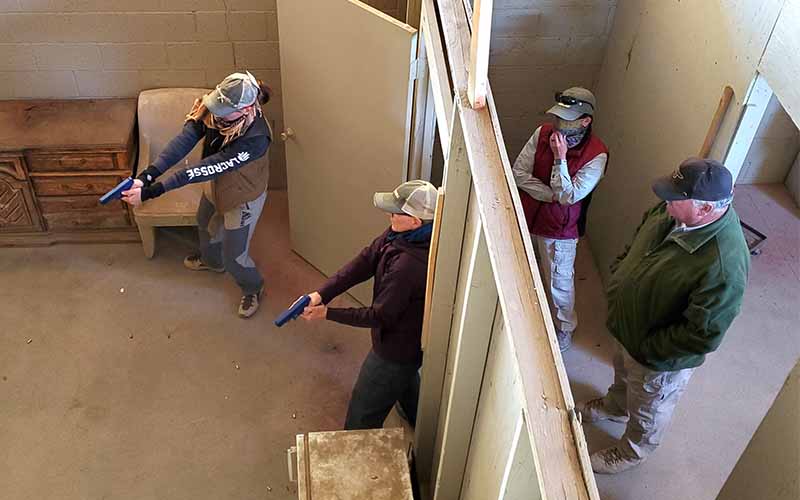
Now you can begin to develop your marksmanship skills. This is where you learn to master sight alignment and trigger control. It’s not where you learn to draw your handgun from concealment, reload your handgun, or learn to operate its controls. Those things should’ve occurred while you were learning to handle your gun. Marksmanship most often starts with shooting from a codified stance, but it must develop to the point you can deliver accurate fire regardless of your position.
The final two elements of weaponcraft involve you taking your marksmanship skills and learning to balance speed and accuracy. It’s where you learn your shot cadence when shooting up close and at distance. It’s where you develop your ability to transition from target to target fast and efficiently. Knowing and executing the proper balance of speed and accuracy is critical to every shot you fire with a self-defense handgun.
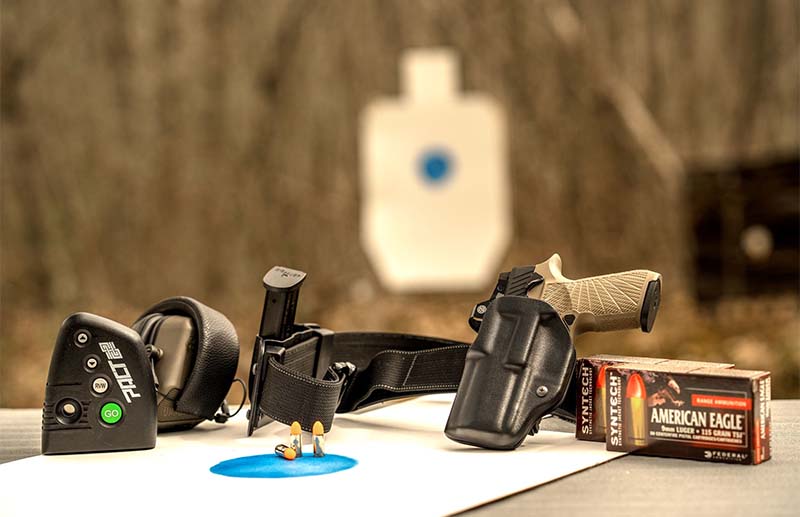
But—and this is very important—mindset is the base element of weaponcraft. As you develop your skills, tactical training teaches you to not only gauge your speed and accuracy, but also how to negotiate life-and-death situations. With good tactics, you might be able to survive without ever shooting, or even touching, your handgun.
And, ultimately, that’s the goal. You want a survival mindset that’ll keep you alive, but at the same time, if your tactics fail, you want the other two elements of the Combat Triad—along with mindset—to take over and adjust your DVC triangle so that you will win.
Editor's Note: This article originally appeared in the October 2022 issue of Gun Digest the Magazine.
More On Defensive Handgun Skills:
- Video: Target Transition Training With The Dot Drill
- The Shot Timer And Defensive Handgun Training
- Gun Digest’s 10 Best Shooting Drills And Firearms Training Posts
- MantisX: Simple And Effective Training
- Video: Is A Full-Sized Pistol The Best Training Option?
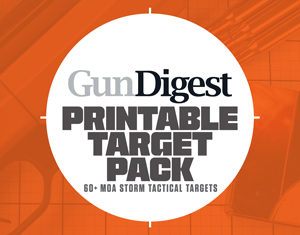
Next Step: Get your FREE Printable Target Pack
Enhance your shooting precision with our 62 MOA Targets, perfect for rifles and handguns. Crafted in collaboration with Storm Tactical for accuracy and versatility.
Subscribe to the Gun Digest email newsletter and get your downloadable target pack sent straight to your inbox. Stay updated with the latest firearms info in the industry.

![Best Concealed Carry Guns In 2025 [Field Tested] Wilson Combat EDC X9S 1](https://gundigest.com/wp-content/uploads/Wilson-Combat-EDC-X9S-1-324x160.jpg)


![Best 9mm Carbine: Affordable PCCs [Tested] Ruger Carbine Shooting](https://gundigest.com/wp-content/uploads/Ruger-Carbine-Shooting-100x70.jpg)
![Best AR-15: Top Options Available Today [Field Tested] Harrington and Richardson PSA XM177E2 feature](https://gundigest.com/wp-content/uploads/Harrington-and-Richardson-PSA-XM177E2-feature-100x70.jpg)
